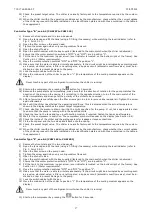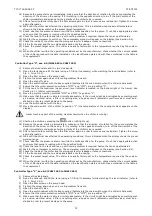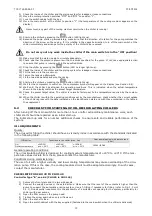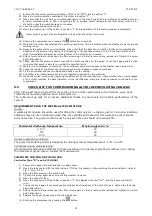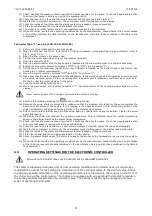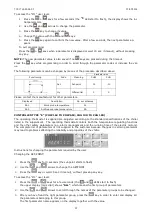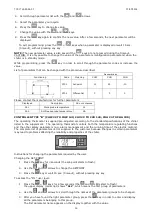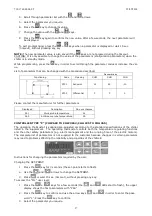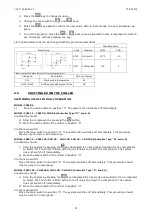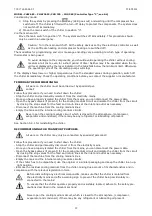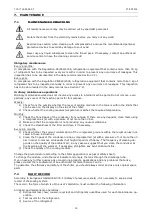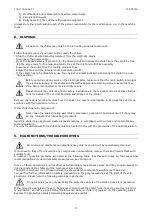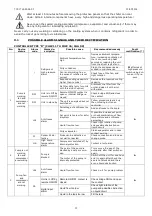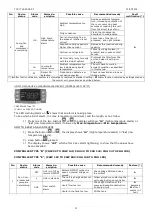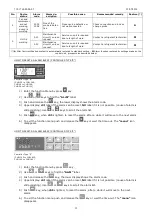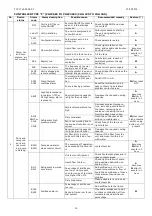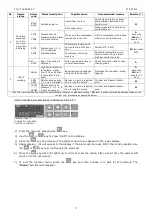
710.1760.00.04-05
22/05/2014
22
17)
Check whether the pressure shown is within the limits specified for the pump. If not, take appropriate action
to ensure that pump is able to run within the specified limits.
18)
Check the level in the tank and top it up if required. Put the tank cap back in place.
19)
Wait for the compressor to switch on. The compressor symbol will appear on the display.
20)
Check the inside of the chiller and the piping system for leakage or loose connections.
21)
Fit the front panel and the two side panels back into place.
22)
The chiller is normally factory-set to the temperature required by the customer.
23)
When the chiller is within the operating conditions set by the manufacturer, check whether the current uptake
of the chiller matches the data indicated on the identification plate and those contained in the table in the
supplement.
Controller Type “C”, see 6.4 (CHG 225 to CHG 365)
1)
Remove the front plate and the two side panels.
2)
Open the tank cap and fill the tank (using a T-fitting if necessary) while watching the level indicator (refer to
Fig. 1, Point 5.2.1).
3)
Open the filler screw on the pump head.
4)
Tighten the screw again when only cooling medium flows out.
5)
Open the shut-off valve.
6)
Open the switch cabinet with the key supplied (Fastened to the main switch when the chiller is delivered).
7)
Ensure that the motor protection switches (“MTC” and “MTP”) are in position “0”.
8)
Fill the tank to the maximum (upper arrow, level indicator is located on the bottom right of the frame). See
Section 6.1.1 (Water requirements).
9)
Move the motor protection switches “MTC” and “MTP” to position “1”.
10)
Make sure that the water is able to circulate adequately. It the circuit might be interrupted by something such
as a valve, electrical valve, a filter or anything else, a by-pass circuit (automatic overflow valve) must be in-
stalled in order to prevent damage to the pump.
11)
Lock the switch cabinet with the key.
12)
Move the main switch of the chiller to position “1” (the temperature of the cooling medium appears on the
display).
Never touch any part of the cooling circuit when the chiller is running!
13)
Start up the chiller by pressing the
button (LED lights up).
14)
Because the pump starts up immediately, make sure that the direction of rotation for the pump matches the
direction of the arrow on the casing. If it is rotating in the opposite direction, turn off the main switch of the
chiller immediately and arrange for the polarity of the chiller to be reversed.
15)
After a few minutes carefully open the filler screw again in order to remove any residual air. Tighten the screw
again afterwards.
16)
Wait until the chiller has attained the operating conditions. This is indicated when the actual temperature
shown in the display matches the preset target temperature.
17)
Check whether the pressure shown is within the limits specified for the pump. If not, take appropriate action
to ensure that pump is running within the specified limits.
18)
Check the level in the tank and top up with cooling medium if required. Fasten the tank cap afterwards.
19)
Wait for the compressor to switch on. The compressor symbol will appear on the display (see Section 6.4).
20)
Check the inside of the chiller and the piping system for leakage or loose connections.
21)
Fit the front panel and the two side panels back onto the casing.
22)
Check the preset target value. The chiller is normally factory-set to the temperature required by the custom-
er.
23)
When the chiller is within the operating conditions set by the manufacturer, check whether the current uptake
of the chiller agrees with the data indicated on the identification plate and with those contained in the table in
the supplement.
6.4
OPERATING SETTINGS FOR THE ELECTRONIC CONTROLLER
All work on the chiller may only be carried out by specialist personnel!
The chiller is supplied pre-adjusted for normal operating conditions and normally does not require any
modifications, except for the setting the temperature of the cooling medium to the desired value. Check-
ing and any possible adaptation of the operating parameters is carried out via the controls on the front of
the chiller and via the control panel. The chillers are equipped with an operating thermostat to maintain
the cooling medium temperature at a constant value. The various models may be equipped with two
types of operating thermostats:
Содержание CHG 08
Страница 39: ...710 1760 00 04 05 22 05 2014 39 1 1 1 CHW CHO CHG chiller CHW CHO CHG 1 2 CHW CHO CHG CHW CHO CHG CHW CHO CHG 2...
Страница 40: ...710 1760 00 04 05 22 05 2014 40 CHW 20 25 CHO 10 cST CHG 20 25 5 EN 60204 EN 378 2...
Страница 41: ...710 1760 00 04 05 22 05 2014 41 HFC CE 842 2006 3 3 1 3 2 C CND EVA HP LP...
Страница 42: ...710 1760 00 04 05 22 05 2014 42 MHP MLP PV R V a 2 5 b VE 2 5 MOP IAF 3 3 MF P...
Страница 43: ...710 1760 00 04 05 22 05 2014 43 BP BPM CAA EV 1 1 VNR FL LVE RA TD VNR EV 1 2 3...
Страница 44: ...710 1760 00 04 05 22 05 2014 44 1 2 3 4 5 6 7 3 4 ALR...
Страница 48: ...710 1760 00 04 05 22 05 2014 48 CHW 97 CHW 3652 4 2 4 3 5 50 C 12 6 5 2 5 5 1 2 C 40 C 2 C 40 C...
Страница 50: ...710 1760 00 04 05 22 05 2014 50 25 1 60 CHO A B C D E Abb 1 TN C 230 1 1 N PE AC 400 3 3 PEN AC PEN...
Страница 65: ...710 1760 00 04 05 22 05 2014 65 CHW 682 CHW 3652 CHG 225 CHG 365 6 4 1 2 0 0 5 2 1...
Страница 67: ...710 1760 00 04 05 22 05 2014 67 5 6 8 9 10 3 20 15...
Страница 68: ...710 1760 00 04 05 22 05 2014 68 9 1 A CHW 11 CHW 36 CHG 08 1 OFF A OFF LA2 P1 SL HA 2 A 3 LA2 2 A CA 4 HA A...










